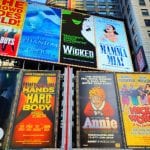 Movies and TV
Movies and TV  Movies and TV
Movies and TV  Our World
Our World 10 Places with Geological Features That Shouldn’t Exist
 Crime
Crime 10 Dark Details of the “Bodies in the Barrels” Murders
 Animals
Animals The Animal Kingdom’s 10 Greatest Dance Moves
 Movies and TV
Movies and TV 10 Box Office Bombs That We Should Have Predicted in 2025
 History
History 10 Extreme Laws That Tried to Engineer Society
 History
History 10 “Modern” Problems with Surprising Historical Analogs
 Health
Health 10 Everyday Activities That Secretly Alter Consciousness
 History
History Top 10 Historical Disasters Caused by Someone Calling in Sick
 Animals
Animals 10 New Shark Secrets That Recently Dropped
 Movies and TV
Movies and TV 10 Weird Ways That TV Shows Were Censored
 Our World
Our World 10 Places with Geological Features That Shouldn’t Exist
 Crime
Crime 10 Dark Details of the “Bodies in the Barrels” Murders
Who's Behind Listverse?

Jamie Frater
Head Editor
Jamie founded Listverse due to an insatiable desire to share fascinating, obscure, and bizarre facts. He has been a guest speaker on numerous national radio and television stations and is a five time published author.
More About Us Animals
Animals The Animal Kingdom’s 10 Greatest Dance Moves
 Movies and TV
Movies and TV 10 Box Office Bombs That We Should Have Predicted in 2025
 History
History 10 Extreme Laws That Tried to Engineer Society
 History
History 10 “Modern” Problems with Surprising Historical Analogs
 Health
Health 10 Everyday Activities That Secretly Alter Consciousness
 History
History Top 10 Historical Disasters Caused by Someone Calling in Sick
 Animals
Animals 10 New Shark Secrets That Recently Dropped
Top 10 Musicals That Are Historically Inaccurate
Even when media doesn’t tout itself as being totally historically accurate, audiences can be swayed by certain portrayals of characters or events. In some cases, people form opinions that aren’t really based on fact, all because they watched it on TV or in a movie.
Many of the shows listed below aren’t purposely misleading audiences: In almost all of them, the inaccuracies listed are simply to make the show flow better or more entertaining. But in any case, all of them have some form of exaggeration, mistakes, or outright lies embedded in the show.
Related: Top 10 Weird Things That Happen in English Renaissance Plays
10 Finding Neverland
The story of Peter Pan has been adapted so many times that it only makes sense they eventually start to focus on the origins of the story and the boys who inspired it. Finding Neverland is based on J.M. Barrie’s relationship with the Davies family, whose sons inspired the iconic tale of Peter Pan and Neverland.
But the musical doesn’t tell the whole story. It claims the Davies sons’ mother was a widow, with whom Barrie eventually develops a romance. This didn’t happen, mostly because the Davies’ father was alive and well.
Similarly, the stage show claims that the Davies’ mother, Sylvia, died before the premiere of Peter Pan in 1904. While this makes a dramatically melancholy ending to Finding Neverland, she actually died in 1910, well after the play had become a success.[1]
9 Catch Me if You Can
How is one supposed to tell a true story if the source material keeps lying?
Really, it shouldn’t have surprised anyone when, in 2023, it was revealed that Frank Abagnale Jr., conman, lied about many of the escapades he claimed in his autobiography, Catch Me if You Can. While the core facts are true, such as that he impersonated a PanAm pilot for years and went to prison in France, many of the other cons, such as teaching a class at Brigham Young University and becoming a consultant to the U.S. Senate Judiciary Committee, were false.
These discoveries also render the movie of the same name inaccurate as well. Considering there wasn’t really any way for the writers of the musical to know what was to come, this one is on the list by technicality.[2]
8 The King and I
While it’s true that in the 1860s, a British schoolteacher made her way to the Siamese court, the romantic relationship between her and the king of Siam, King Mongkut, is completely fake. Though this may not be entirely the work of the creators of the show.
The musical is based on Anna Leonowens’ autobiography of her time in modern-day Thailand. The book was probably written to profit from the rampant Orientalism in Victorian England. It included many liberties that Thai government officials say are completely untrue, including the violent scene of a monk being tortured, which no Thai resident of the time recalls happening.
Upon reading the novel, the King of Siam responded that Anna “has supplied by her invention that which is deficient in her memory.”[3]
7 Six
I know, it’s a crime not to rank this one number six.
Six took the world by storm when it premiered in Edinburgh in 2017. This pop musical is essentially a rock concert performed by the six wives of Henry VIII, where each wife competes to “win” a singing competition judged by the audience.
Artistic liberties are taken, but most of them are exacerbated to a point where no one would believe everything was true (such as Henry and Anna of Cleves meeting on a dating app).
However, some of the lyrics and personifications of these historical women take away from who they really were. The most glaring of these is when Anne Boleyn sings, “I wanna dance and sing / Politics, not my thing.” Her song continues to imply that she just wanted to have some fun with Henry in the court, not become queen.
This does the real Anne of Boleyn a true disservice, as she was one of the most politically savvy and cleverly involved female leaders in history. While not everything is known about her life, historians agree that her high status in court was the result of hard work, not luck.[4]
6 The Sound of Music
The hills are alive with the sound of falsehoods.
Well, that’s a little dramatic. The majority of this classic musical’s plot is true, but only technically. While Maria did end up marrying Georg von Trapp, the father of many (ten) children, she was only ever governess to one of them. Even worse, while she did end up marrying Georg, she never loved him. She’s quoted as saying,” I loved the children, so in a way, I really married the children.”
But the most surprising of these comes from Maria herself, who is reported as having been harsh and authoritarian. One of the daughters said she had a terrible temper and had angry outbursts that included yelling, throwing things, and slamming doors.
Not that the real Maria couldn’t also be the sweet stepmother she’s portrayed as in the musical, but I think we can all agree it’s hard to imagine Julie Andrews or Mary Martin doing anything but singing sweetly in the face of adversity from the children.[5]
5 Funny Girl
Funny Girl focuses more on the entertainment aspect of musicals than the educational and historically accurate. This is unsurprising, considering the main character herself wanted nothing more than to delight and engage audiences.
Fanny Brice was not raised in poverty and squalor, as the musical dramatically suggests, but in rather well-to-do apartments throughout Brooklyn. And she was never a haphazard member of a chorus line of gorgeous girls, as one of the first scenes suggests: From the beginning, she was a solo singer.
The Fanny in the musical is hopelessly devoted to gambling criminal Nick Arnstein. This is true in real life, although the historical story isn’t quite as nice. Musical-Nick continues to gamble and work after Fanny’s fame because he claims he doesn’t want to use her money. Real-Nick was a criminal at heart and had no problems using his wife’s wages when he needed them.
At no time is this more evident than when Nick was arrested in 1920. Rather than turning himself in to the police for stealing Wall Street securities, like he does in the musical, Nick hid out for four months and then fought the charges for years. His legal bills were, of course, paid for by his wife. So, while the musical does depict marital problems between the two, it romanticizes Nick as a gallant and intelligent (and good-looking) conman stuck between his life of crime and his wife when there really wasn’t ever any competition between the two.[6]
4 Bloody Bloody Andrew Jackson
No, President Andrew Jackson wasn’t a rock star.
At least, not literally. But he was a controversial and imposingly popular figure in his time, almost the modern-day equivalent of a star, which is where the plot of BBAJ comes from. Following Jackson’s rise to political fame and influence and his eventual fall from grace, the musical makes some minor changes that don’t affect much of the plot or the audience’s understanding of history.
But one big change can have a profound effect on viewers: The show depicts Jackson’s family being brutally murdered by Native Americans. Later on in the show, this motivation helps explain why Jackson hates American Indians so much and, in a way, justifies his displacement of them through the horrifically violent Trail of Tears.
However, most of Jackson’s family died from disease, and none at the hands of Native Americans. Really, there was no reason for Jackson to hate the Native Americans other than his own racism, which the show inadvertently gives excuses for through this single scene.[7]
3 Annie Get Your Gun
Girls and guns: What more do you need?
Annie Oakley mesmerized touring sharpshooter Frank Butler in 1875 when she, at the age of 15, beat him in a shooting contest. In real life and in the musical adaptation of her life, she ends up marrying Frank and touring the world in Buffalo Bill’s Wild West Show, but the plot of the show differs from real life.
Before they’re happily married at the end, Annie Get Your Gun paints Frank as being jealous that a girl could possibly be a better shooter than him. The two compete for top billing in shows until Annie finally throws a competition to make Frank feel better about himself.
Anyone who knows what Anne Oakley was like knows this never really happened. She was fiercely proud of her skills, and there’s no evidence to show she lost to fuel her husband’s ego. There’s also no historical record of a rivalry between her and Frank. Rather, this was between Annie and a younger girl named Lillian Smith.[8]
2 Gypsy
Rose Hovick was the ultimate stagemother. When her first daughter was born in 1911, she forced her into dance and singing classes in the hopes that she would become the next big thing. When that didn’t work, she had another daughter, who ended up becoming a vaudeville hit.
Gypsy follows eldest daughter Louise as she leaves her controlling mother and becomes one of the most famous striptease performers of all time. It’s based on the memoir of the same name, but the stage musical made a few changes.
To start, Louise and her sister June were only one year apart in age, not the several that the musical suggests. The sisters also were not as friendly with each other as the show makes it seem. In Gypsy, the girls support each other’s dreams, June’s to be a performer, and Louise’s to make it out of her mother’s clutches. In reality, Louise thought that June’s act was juvenile and her sister was a fool for doing it, while June felt she was better than her non-performing sibling.[9]
1 Newsies
This Broadway musical is an adaptation of the 1992 movie, which was, at the time of its release, one of the lowest-grossing live-action Disney movies of all time. But in 2012, Newsies got a chance to redeem itself, and that it did: Newsies on Broadway went on to win eight Tony Awards, including Best Musical.
The show follows a group of New York City newsboys as they go on strike against Joseph Pulitzer, publisher of the New York World. It’s based closely on the Newsboys Strike of 1899, which helped lead to other strikes from underpaid and overworked employees throughout the beginning of the 20th century.
But when it comes down to it, Newsies is a Disney property. And Disney has a long history of sanitizing history to make a story a bit happier. As such, there are quite a few inaccuracies in Newsies, starting with the ending. In the movie, the newsboys gather a crowd of children who eventually wear Pulitzer down until he agrees to lower the price of the papers again. In reality, the strike ended in a compromise, with Pulitzer agreeing to buy back unsold paper from the newsies.
The main character in the musical and movie is Jack Kelly, who never existed as far as history knows. The real strike was led by a boy named Kid Blink, who is featured as a side character in the movie but omitted entirely from the Broadway adaptation. In real life, Kid Blink ended up accepting a bribe from news executives and was subsequently discredited and mocked by the rest of the strikers.
Additionally, by 1899, the real Joseph Pulitzer was nearly ten years retired and virtually blind and deaf. But it’s not as fun to watch a disabled, elderly man lose as it is to watch the smarmy, oily Pulitlzer of the musical admit defeat.[10]








